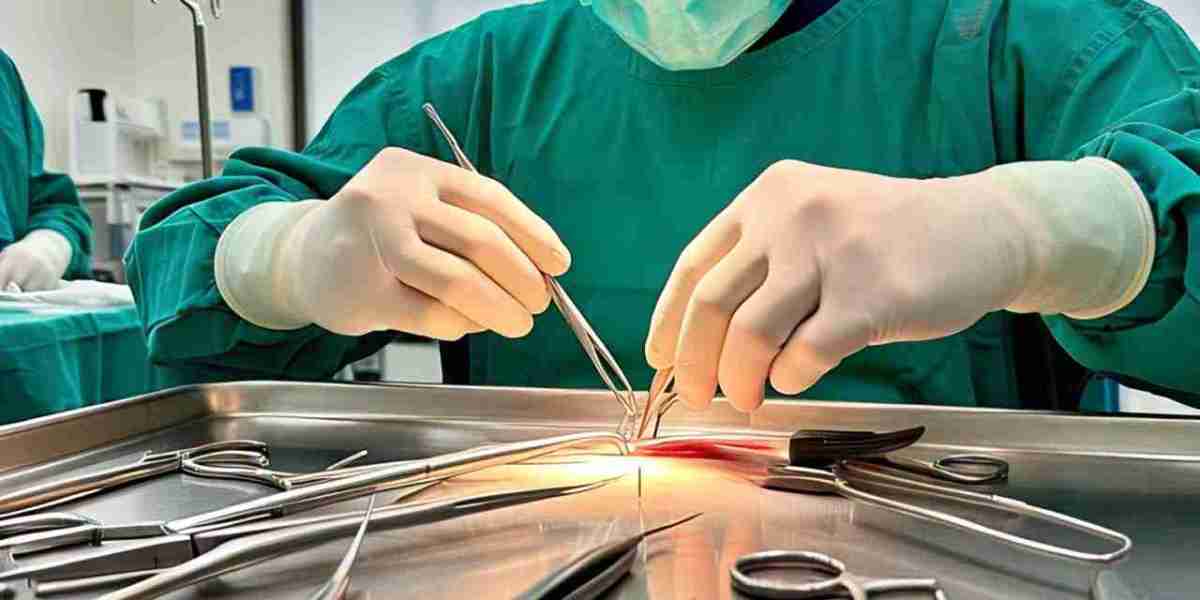Why High-Quality Surgical Instruments Are Essential for Effective Emergency Surgery
In emergency surgery, every second counts, and the tools surgeons use can make the difference between life and death. High-quality surgical instruments are critical to ensuring that surgeries are performed efficiently, accurately, and safely. From delicate procedures to complex interventions, the right tools are essential to achieving positive patient outcomes. Let’s dive deeper into why high-quality surgical instruments are essential for effective emergency surgery.
The Role of Surgical Instruments in Emergency Procedures
Surgical instruments are essential for performing emergency procedures with precision and efficiency. In emergency situations, surgeons must act quickly while maintaining the highest standards of accuracy. Using advanced, high-quality surgical tools reduces the chances of complications, ensuring that surgeries are completed safely. These instruments help minimize the risk of infection, reduce recovery time, and ultimately improve patient outcomes.
Precision in Emergency Surgery
One of the most significant factors in emergency surgery is precision. Surgeons need instruments that offer control and accuracy, especially when performing delicate operations. High-quality instruments are designed to meet these demands. They provide better handling, sharper tips, and more accurate cuts, ensuring that every incision and stitch is done with care. This level of precision is essential in time-sensitive operations, such as trauma or cardiac surgery.
Reducing Risk with Superior Materials
Quality surgical instruments are made from premium materials like stainless steel, titanium, or cobalt chrome. These materials not only ensure durability but also reduce the risk of infection or complications. High-quality instruments resist corrosion, maintain sharpness, and are less likely to cause allergic reactions, offering surgeons a reliable tool for every procedure. Instruments made with subpar materials, on the other hand, can cause complications, leading to extended recovery times or even patient harm.
Durability and Longevity of High-Quality Instruments
In an emergency surgery setting, surgical instruments must be able to withstand high-pressure conditions. High-quality surgical tools are built to last, even under intense and repeated use. Their durability ensures that they remain sharp, functional, and dependable throughout many surgeries, making them a cost-effective investment for medical facilities. Instruments that degrade quickly, on the other hand, can result in more frequent replacements and increased risks during surgeries.
The Importance of Ergonomics in Surgical Instruments
Surgical procedures can be grueling, and surgeons often work in uncomfortable positions for long hours. High-quality surgical instruments are designed with ergonomics in mind, offering better grip, balance, and ease of use. These ergonomic features not only reduce the physical strain on surgeons but also increase their efficiency during emergency surgeries. Instruments that are difficult to handle or uncomfortable to use can increase the chance of errors, which can be catastrophic in emergency surgery.
Enhancing Surgical Team Efficiency with Quality Tools
In emergency surgery, the surgical team must work in unison to provide the best care. High-quality surgical instruments contribute to the efficiency of the entire team. With tools that are easy to use and designed for specific tasks, surgeons, nurses, and assistants can work more quickly and seamlessly together. This coordination is crucial in high-stress situations, where every moment matters.
The Safety of the Patient Comes First
Above all, patient safety is the top priority in emergency surgery. High-quality surgical instruments are designed to minimize the risk of injury or infection during procedures. Well-made tools reduce the chances of tissue damage, bleeding, and complications. Moreover, they help ensure that surgeries are completed smoothly, leading to shorter hospital stays and faster recovery times for patients. Ultimately, using top-tier instruments enhances the overall safety of the procedure and the patient's health.
Specialized Instruments for Complex Procedures
Emergency surgeries often involve complex and specialized procedures, such as neurosurgery, cardiac surgery, or ophthalmic surgery. High-quality instruments are designed for specific tasks, ensuring that surgeons have the exact tools they need for complex operations. For example, ophthalmic surgical instruments are designed for precision work in the delicate areas of the eye. Instruments such as these are essential in ensuring that surgeries involving sensitive organs are performed accurately and safely. Explore ophthalmic surgical instruments here.
Cutting-Edge Technology in Surgical Instrument Design
Modern surgical instruments are continually evolving to incorporate the latest technological advancements. High-quality tools feature innovative designs that improve their functionality and usability. For instance, many instruments now feature enhanced coatings to prevent rust, improve grip, or make cleaning easier. The integration of advanced technology ensures that surgeons have the best tools available to perform high-risk surgeries effectively.
Sterility and Hygiene in Emergency Surgery
Sterility is critical in any surgical procedure, but especially in emergency situations, where the risk of infection is heightened. High-quality surgical instruments are designed for easy sterilization and maintenance, ensuring that they remain free from contaminants. The materials used in these instruments also prevent bacterial growth, keeping the tools safe for use in the operating room. Using substandard instruments that are difficult to sterilize can increase the risk of postoperative infections and complicate the recovery process.
Speed and Precision: The Key to Successful Emergency Surgery
Emergency surgeries are often performed under time constraints, with life-threatening conditions requiring immediate attention. High-quality surgical instruments allow for faster, more accurate procedures. Whether it's cutting tissue, suturing, or removing foreign objects, quality instruments enable surgeons to work quickly without sacrificing precision. This speed is crucial in emergency surgery, where every second counts.
The Cost-Effectiveness of High-Quality Surgical Instruments
While high-quality surgical instruments may have a higher upfront cost, they are more cost-effective in the long run. Due to their durability, precision, and performance, these instruments last longer, reducing the need for frequent replacements. They also reduce the likelihood of complications during surgery, which can lead to longer hospital stays and higher healthcare costs. In the end, investing in quality surgical tools can save both money and lives.
Why You Should Invest in High-Quality Surgical Instruments
Hospitals, clinics, and surgical centers should prioritize the purchase of high-quality surgical instruments to ensure that their surgical teams are equipped to perform the best possible procedures. Quality instruments improve the efficiency, safety, and overall success of emergency surgeries, making them a vital part of any medical facility's toolkit. If you're looking for reliable surgical instruments, visit TSurgical Instruments to explore a wide range of options.
FAQs
1. Why are high-quality surgical instruments important for emergency surgeries?
High-quality surgical instruments offer precision, durability, and reliability, ensuring safer, faster, and more effective procedures in emergency situations.
2. What materials are used to make high-quality surgical instruments?
Premium materials like stainless steel, titanium, and cobalt chrome are used for their strength, resistance to corrosion, and longevity.
3. How do ergonomic features in surgical instruments improve surgery outcomes?
Ergonomic designs help reduce strain on surgeons, leading to better control and precision, and ensuring faster, more efficient procedures.
4. Are specialized instruments necessary for certain types of emergency surgery?
Yes, specialized instruments, such as ophthalmic tools for eye surgery, are critical for performing complex procedures accurately.
5. Can using substandard surgical instruments increase the risk of complications?
Yes, inferior instruments can cause tissue damage, infection, and surgical delays, increasing the risk of complications.








